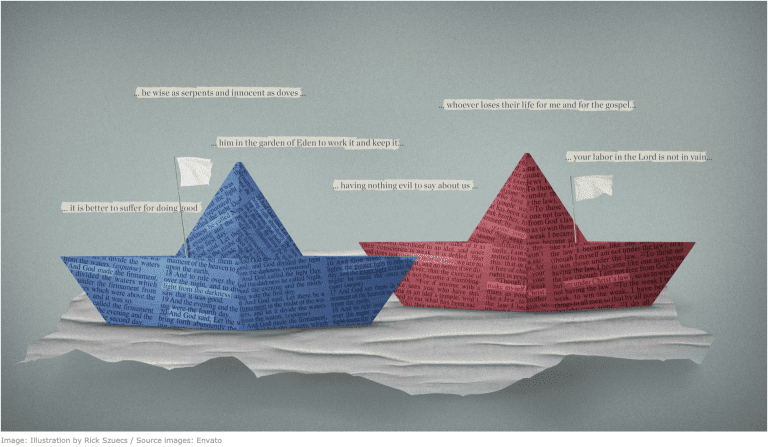Hundreds of books and articles talk about contextualization. Nearly every one of them focuses on two questions: What is contextualization? How do we contextualize? Of course, those are important questions. There is a more fundamental question that too often gets overlooked––Why should we contextualize the gospel?
Why we contextualize determines how we contextualize. Perhaps, one reason people struggle with how to contextualize is that they don’t sufficiently grasp why to contextualize.
Contextualization Saves the Gospel
“Contextualization” shapes every aspect of the Christian life. It is more than a missionary strategy, a narrow evangelistic concern.
Contextualization refers to the process wherein people interpret, communicate, and apply the Bible within a particular cultural context.
“All theology is contextualized” has become a well-known dictum. Our question is not whether we contextualize the gospel; that’s inevitable. The real issue is whether we do it well.
Unless we intentionally contextualize the gospel, we might even lose the gospel. How so? If we are not careful, our message will neither be biblically faithful nor culturally meaningful. We will then be content with being relevant only to the theological tradition of our denominational or organizational subculture.
In One Gospel for All Nations, I try to develop a more holistic contextualization model. There are four fundamental reasons we need a new perspective regarding contextualization. Today, I answer the why question. In the next post, we’ll revisit the “how” question. If we lose sight of the purpose of contextualization, we will inevitably slide into pragmatism and theological partisanship.
1. All of Life
We contextualize the gospel in order to make disciples, not converts. Therefore, biblical contextualization seeks to transform people’s entire view of the world, not merely their religious affiliation and traditions. All too often, many have reduced contextualization to an evangelism strategy. Yet, the gospel announces that Jesus is king now and forever, not merely “in the next life.” To ensure someone is saved from future judgment, many people proclaim what they regard as the basic doctrines of the Christian faith.

Some people think contextualization means finding a “redemptive analogy” that conveys a theological idea. Perhaps, this makes for an interesting first conversation, but it doesn’t get to the gospel’s underlying worldview.
Our gospel message does not necessarily touch upon the whole of people’s lives simply because we change some wording and imagery. It might still seem like we’re offering just another religious option otherwise disconnected from the concrete realities of life. If we have a superficial view of contextualization, our message will sound foreign and fragmented.
For some, contextualization is little more than a tool for efficient communication. However, efficient evangelism might not make faithful followers.
2. All of Scripture
Typically, people regard contextualization as something we do to the gospel. This is only a partial truth. After all, Scripture reveals a gospel that is already contextualized. (More on that point in my third post in this series). Nowadays, people equate contextualization only with communication and application. In other words, one does exegesis and theology, and then they contextualize the message.
This is a fundamentally problematic perspective. As I explain in Saving God’s Face, we miss that contextualization begins with interpretation. Yet, when we “assume the gospel,” we easily confuse the gospel with the particular emphases of our theological tradition.

When we have a more robust view of contextualization, the entire biblical canon shapes our gospel perspective. One is freed to use the grand biblical Story when presenting the gospel, not merely passages from Romans and Galatians.
God inspired the entire Bible, not simply Paul’s letters. When we grasp this point, we are closer to understanding why Paul directly equates the Abrahamic covenant with “the gospel” (Gal 3:8).
3. All Nations
The gospel is for all nations. Sadly, too many people worldwide think the God in the Bible is a Western God. I have regularly spoken with these people. There are various reasons for this.
One reason is that people (like missionaries) typically share the gospel in a rather Western way. I don’t at all imply that “Western theology” is somehow “bad” or “false.” However, a traditional Western contextualization of the gospel is merely one way of presenting the gospel. This shouldn’t surprise us since even the biblical writers vary in how they express the gospel.
Therefore, we need to take contextualization seriously in order that all nations will know the one true God.
4. All Generations
Unfortunately, people too often judge churches by their size. Among many missionaries, a similar measure is used to judge one’s ministry––speed. In some circles, the worth of a ministry strategy or method primarily depends on whether it leads to rapid reproduction.

From this perspective, pragmatism wins out over genuine contextualization. One can simply observe what others have done, “reverse engineer” the process, and then expect God to bring about a rapid multiplication of churches. When churches plant churches, the result is sometimes called “generational growth.”
Pragmatism, however, can be shortsighted. It is hardly worthy of the name “generational growth” when churches are planted rapidly but few last ten years later.
Contextualization that is biblically faithful and culturally meaningful will invest in the long-term maturity, not merely short-term multiplication. We should judge contextualization methods not based on what is fast but rather on what will last.
Why We Need a New Perspective
By starting with why we should contextualize, the Bible reminds us of our true priorities.
Fundamentally, we want to make disciples who follow Christ and faithfully interpret Scripture for the sake of all nations until Jesus returns. I’ll explore an important, practical implication of what I’ve said above in the next post.
In your church or organization, how do people typically think about contextualization?
How have you answered the question, “Why should we contextualize?”


















